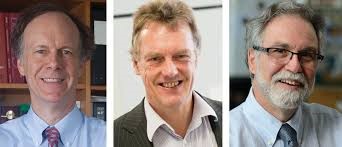William G. Kaelin Jr. Peter J. Ratcliffe Gregg L. Semenza
Nobel Prize in Medicine for the year 2019 has been shared by three scientists; Drs. William G. Kaelin Jr., Sir Peter J. Ratcliffe and Gregg L. Semenza, for their discovery on how cells of the body sense and adapt to oxygen levels. Animals use oxygen to produce energy from glucose in the mitochondria of the cells. When there is insufficient supply of oxygen in the cells (hypoxia), the body increases the production of red blood cells by increasing the production of the hormone erythropoietin (EPO). Semenza and Ratcliffe unraveled the mysteries of how the oxygen levels regulate the functionality of EPO gene and found that this oxygen sensing mechanism was present not only in kidney cells but also in all tissues. Semenza discovered a protein complex known as hypoxia-inducible factor (HIF) which is a DNA binding protein and identified gene encoding HIF. Kaelin while working on an inherited syndrome, von Hippel-Lindau’s disease (VHL), found that VHL gene controls the responses to hypoxia, and also demonstrated that VHL can interact with HIF in response to oxygen levels in the cells. Now with the information on oxygen sensing mechanism of cells, it is possible to understand the metabolic processes during intense exercise under low oxygen levels, in high altitude residents with low oxygen pressure their acclimatization and adaptive processes of angiogenesis and the production of more red blood cells. These discoveries would also be helpful during fetal development for controlling normal blood vessel formation and placenta development, in handling renal failure and anemia and in managing different types of cancers by modulating oxygen supplies. It would help pharmaceutical research to focus on activating or blocking the oxygen sensing machinery to produce suitable drugs for different diseases. These discoveries can be termed as ‘game changers’ in disease management.
William, G. Kaelin, Jr., born in 1957 did his M.D. from Duke University, Durham and obtained his specialized training in internal medicine and oncology from John Hopkins University, Baltimore and has been working as a full professor at Harvard Medical School since 2002. Sir Peter J. Ratcliffe was born in 1954 and studied medicine at Gonville and Caius College at Cambridge University. At Oxford University he was trained in nephrology for his specialization where he became a full Professor in 1996 and is the Director, Clinical Research at Francis Crick Institute, London and Director for Target Discovery Institute in Oxford.
Gregg L. Semenza born in 1956 is an alumnus of Harvard University who obtained his MD/PhD degree from University of Pennsylvania. School of Medicine, Philadelphia. After getting his specialist training in pediatrics from Duke University Durham he did his postdoctoral training at John Hopkins University where he became a full professor in 1999 and is the Director of the Vascular Research Program at the John Hopkins Institute for Cell Engineering since 2003.
Professor S. P. Singh, Ph.D.
Editor-in-Chief, Human Biology Review
Former Dean, Faculty of Life Sciences,
Punjabi University, Patiala, India
